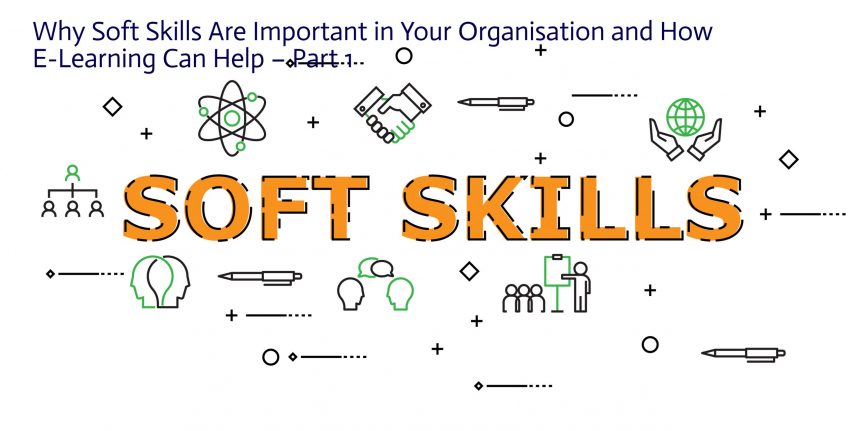Why Soft Skills Are Important in Your Organisation and How E-Learning Can Help – Part 1
It makes sense in business to place a lot of emphasis on ensuring your team has the technical and hard skills required to meet the expectations of your clients. What about soft skills, though?
Soft skills are becoming more and more important to organisations in Dubai and across the world. The problem is that much of the time spent in education acquiring degrees and other qualifications involves learning hard skills. Therefore, organisations are increasingly investing in soft skills training to upskill their employees.
Why are soft skills so important, however, and what are the benefits of providing soft skills training for your employees?
What Are Soft Skills?
Before getting into those questions, let’s first outline the specific skills that come under the umbrella of soft skills.
There are, of course, a lot of soft skills, some of which will only be applicable to certain businesses and industries. However, there are soft skills that are common to almost all businesses including:
- Good communication
- Empathy and emotional intelligence
- Time management
- Ability to effectively delegate
- Collaborative working
- Ability to motivate and encourage
- Creativity and lateral thinking
- Problem-solving
- Team building
- Conflict resolution
- Adaptability
- Positivity and optimism
- Ability to work under pressure
All of the above soft skills can deliver tangible results and improvements in your organisation.
Why Are Soft Skills Important?
Soft skills can’t replace hard skills and they can’t make up for, or cover over, a lack of technical ability. They still offer a wide range of benefits, however, so should not be neglected.
In fact, if you’re not investing in soft skills training in your organisation, you should start. Let’s look at some of the most important reasons why this is the case.
Technical / Hard Skills Are Not Enough
It is very rare that a technical or hard skill will be enough on its own. Instead, your employees will also need soft skills to ensure they are as successful and productive as possible.
For example, an engineer with excellent technical skills will build better relationships with clients if he/she also has good communication, problem-solving, and collaborative working skills.
In other words, soft skills in this example enhance the effectiveness of the engineer’s hard skills. This then improves overall results and outcomes for the business.
Modern Workplaces Require People to Have Soft Skills
Managers shouting at employees to get things done, teams operating in silos that they fiercely defend, time being wasted on non-productive tasks – these are examples of things that are fast becoming non-existent in modern workplaces.
This is because they are no longer acceptable forms of behaviour, and rightly so.
In their place are things like team working, emotional intelligence, and motivational skills. These soft skills and others should be developed in your organisation.
Ensures You Remain Competitive
Customer service is everything so without it, you will struggle. After all, it is usually possible for a business to find a supplier with the technical capabilities they need.
In many industries, therefore, customer service becomes one of the main differentiators when a business/individual is making a purchasing decision.
For you to ensure customer service is as good as possible in your business, your team needs soft skills.
Rapid Advances in Technology
New technologies are increasingly taking over tasks that were previously completed by people, i.e. people with technical or hard skills. Therefore, technology is reducing the need for technical skills in a number of areas. This, in turn, increases the value of soft skills.
Helps You Retain Clients
Hard skills are likely to help you win clients. For example, having the right hard skills in your organisation will ensure you deliver on client objectives that you can then use to demonstrate a track record of success.
Soft skills, however, are essential to your success in keeping clients.As keeping existing clients is much more cost-effective than acquiring new clients, the importance of soft skills in this area should not be underestimated.
Reduces Staff Turnover
There are two main ways that soft skills help to reduce staff turnover. The first is that people work together better in organisations that take steps to ensure their employees are happy, i.e. steps like providing training in soft skills such as emotional intelligence, teamwork, and motivational skills for managers.
The other way that soft skills help to reduce staff turnover is in relation to employees achieving their career goals. Employees who believe they are progressing and can reach their full potential are more likely to stay. Developing their soft skills will help with this.
The Leaders in Your Organisation Will Lead
One group of employees that will benefit significantly from soft skills training is your managers.
As you know, being a manager and a leader are two different things. In addition, it is leaders who deliver the best results for your business.
Soft skills training can turn managers into leaders.
Operate More Efficiently
Your business will also operate more efficiently when your employees have strong soft skills. For example, good time management skills will prevent deadlines being missed, good communication will reduce errors and other problems associated with poor communication, and good leadership skills will improve productivity.
How E-Learning Can Help
As you can see from the above, soft skills are important. That said, they are often hard to learn and, by extension, hard to teach.
In Part 2 of this blog series, we’ll look at how e-learning can help improve soft skills standards in your business.
